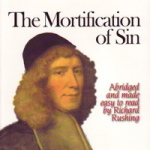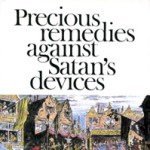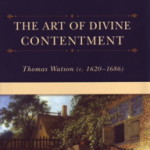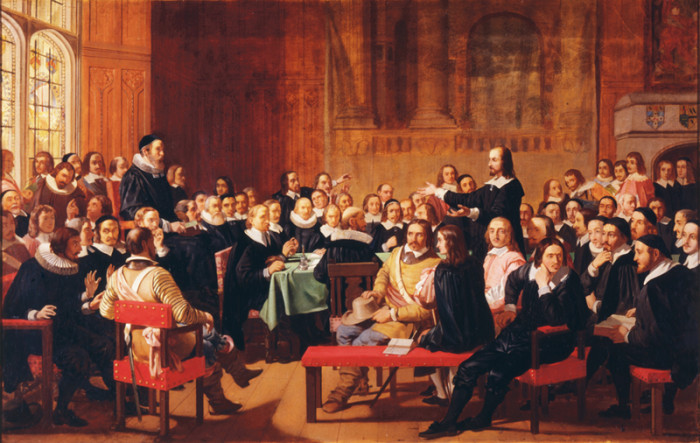My pathway into the Puritans began, unexpectedly, in the spring of 2007 when I read George Marsden’s Jonathan Edwards: A Life. I found Edwards’ passion for God’s glory and personal holiness captivating. What fascinated me most about his spirituality was his heavenly-mindedness. Thinking Edwards was a “Puritan” (he’s technically isn’t) I googled, “Puritans and heavenly mindedness.” Over 800,000 hits came back and my life has never been the same.
I came across J.I. Packer’s A Quest for Godliness and a bunch of works by some guy named Joel Beeke. I devoured these secondary sources with an appetite bordering on gluttonous. But I had yet to really get into the original Puritan works.
Ad Fontes!
That all changed on Christmas Day 2008 when generous family members ushered in, what I’ve come to call, “The Winter of Puritan Paperbacks.” Banner of Truth’s wonderful reprints opened my eyes to new vistas of doxological approaches to theology. From there, I purchased the complete works of Boston, Brooks, Bunyan, Flavel, Goodwin, Sibbes, and Swinnock. It seemed as though I was always reading a Puritan work; I was squarely in their grip and there I remain.
In the Puritans I find reverent affection for our great God.
In the Puritans I find doctrinal precision coupled with experiential application.
In the Puritans I find a devotion to worship God in all of life.
In the Puritans I find a passion to be with Christ’s church in worship.
In the Puritans I find a peculiar strength for suffering.
In the Puritans I find a delightful submission to God’s providence.
In short, the Puritans train my soul for joy. I believe they can do the same for you.
A Very Good Place to Start
Many Christians – and pastors – today live with spurious assumptions about the Puritans: “They are killjoys!” “They are impossible to read!” “They are crazy, introspective legalists!” There are, to be sure, some verbose, legalistic joy-crushing Puritans, but those men are an aberration within the movement. The overwhelming majority are “Doctors of the Soul” without peer in church history.
The only way you’ll know if I’m right or wrong is to step into the Puritans waters (come on in, the water’s great!). Here are a few works that capture the Puritan ethos and will likely cause you to swim deeper into this ocean of spiritual goodness.
 The Mortification of Sin by John Owen. Jerry Bridges said, “John Owen’s treatises on Indwelling Sin in Believers and The Mortification of Sin are, in my opinion, the most helpful writings on personal holiness ever written.” JI Packer once wrote, “I owe more to John Owen than to any other theologian, ancient or modern, and I owe more to this little book (The Mortification of Sin) than to anything else he wrote.”
The Mortification of Sin by John Owen. Jerry Bridges said, “John Owen’s treatises on Indwelling Sin in Believers and The Mortification of Sin are, in my opinion, the most helpful writings on personal holiness ever written.” JI Packer once wrote, “I owe more to John Owen than to any other theologian, ancient or modern, and I owe more to this little book (The Mortification of Sin) than to anything else he wrote.”
No one, outside of the apostles, peered so deeply into the human heart and the glory of Christ as this Prince of Puritans. Owen is thus unusually able to steel our gaze against the heart-fortresses of sin. His application of truth to the believer’s sin-slaying work is, at certain points, breathtaking. In the fall of 2013 I had a few dozen men in my church read The Mortification of Sin and a large handful said something like, “This is one of the most useful books I’ve ever read!” If you read one book the rest of this year, make it Owen’s classic. I promise your soul will say, “Thank you.”
 Precious Remedies Against Satan’s Devices by Thomas Brooks. One area where the Puritans uniquely excel is on the always pressing topic of spiritual warfare. When it comes to Satan’s schemes, Brooks knows best. I don’t think Banner of Truth is exaggerating when they say, “Brooks treated the seductive influence and terrible power of Satan in a way greatly more full and suggestive than in the literature of the present day.” Brooks takes on 38 (!) different favored devices of the Worm and gives specific remedies for each one. His insight into Satan’s ways are stunning. The final chapter, “Ten Special Rules Against Satan’s Devices” is pure gold. Spurgeon had a particular affection for Brooks, saying,
Precious Remedies Against Satan’s Devices by Thomas Brooks. One area where the Puritans uniquely excel is on the always pressing topic of spiritual warfare. When it comes to Satan’s schemes, Brooks knows best. I don’t think Banner of Truth is exaggerating when they say, “Brooks treated the seductive influence and terrible power of Satan in a way greatly more full and suggestive than in the literature of the present day.” Brooks takes on 38 (!) different favored devices of the Worm and gives specific remedies for each one. His insight into Satan’s ways are stunning. The final chapter, “Ten Special Rules Against Satan’s Devices” is pure gold. Spurgeon had a particular affection for Brooks, saying,
Had Brooks been a worldly man, his writings would have been most valuable; but since he was an eminent Christian, they are doubly so. He had the eagle eye of faith, as well as the eagle wing of imagination. He saw similes, metaphors, and allegories everywhere; but they were all consecrated to his Master’s service.
 The Art of Divine Contentment by Thomas Watson. If there was an award for “The Most Readable Puritan” its recipient would surely be Thomas Watson. Joel Beeke says Watson stands out from all the rest because of his “depth of doctrine, clarity of expression, warmth of spirituality, love of application, and gift of illustration.” You really can’t go wrong with any of Watson’s works (All Things for Good and The Doctrine of Repentance are excellent), but I suggest The Art of Divine Contentment because the subject is a perennial struggle for every Christian. Launching off from Philippians 4:11, Watson writes, “For my part, I know not any ornament in religion that doth more bespangle a Christian, or glitter in the eye of God and man, than this of contentment. . . . If there is a blessed life before we come to heaven, it is the contented life.”
The Art of Divine Contentment by Thomas Watson. If there was an award for “The Most Readable Puritan” its recipient would surely be Thomas Watson. Joel Beeke says Watson stands out from all the rest because of his “depth of doctrine, clarity of expression, warmth of spirituality, love of application, and gift of illustration.” You really can’t go wrong with any of Watson’s works (All Things for Good and The Doctrine of Repentance are excellent), but I suggest The Art of Divine Contentment because the subject is a perennial struggle for every Christian. Launching off from Philippians 4:11, Watson writes, “For my part, I know not any ornament in religion that doth more bespangle a Christian, or glitter in the eye of God and man, than this of contentment. . . . If there is a blessed life before we come to heaven, it is the contented life.”
Tolle lege!

